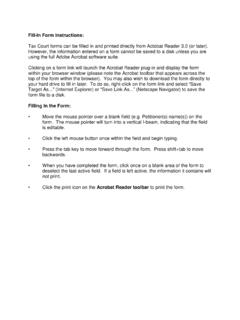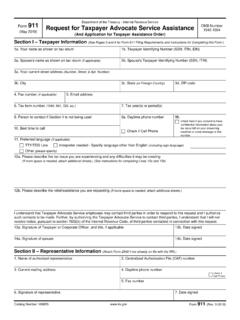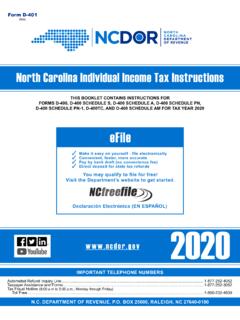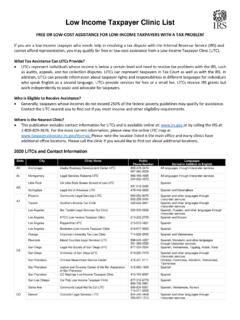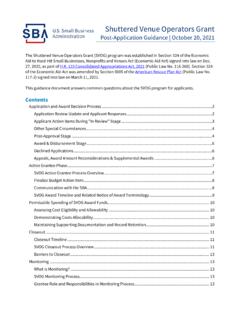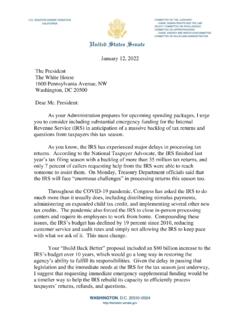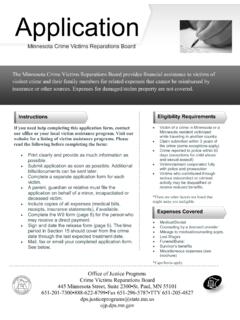Transcription of Is there anyone who can help me file a petition and/or ...
1 - 2 - You can also file a petition (in certain circumstances) if you filed a claim with the IRS for relief from joint and several liability ( innocent spouse relief ), six months have passed, and the IRS has not issued you a determination letter. Is there anyone who can help me file a petition and/or help me in my case against the IRS? Yes. You may hire an attorney or other person admitted to practice before the Tax Court to represent you before the Tax Court. You might qualify for help from an organization referred to as a tax clinic.
2 there are a number of tax clinics throughout the United States participating in the Tax Court s Clinical Program. You may want to contact a clinic in your geographic area. The Internal Revenue Service ( taxpayer advocate Service) has a list of tax clinics on its website. The clinics have income restrictions, and a representative of the clinic will let you know whether you qualify to be represented. The Tax Court will send you information about tax clinics when you file your petition and when a Notice of Trial is sent to you.
3 there is additional help from organizations we refer to as calendar call programs. Tax practitioners volunteer their time to assist unrepresented low income taxpayers through professional organizations. If there is a participating Calendar Call Program in the city where you have requested trial, the Judge may identify the volunteer practitioners at the beginning of the trial session. These tax clinics and Bar-related calendar call programs are not part of the Internal Revenue Service or the Tax Court.
4 The Tax Court does not endorse or recommend any particular tax clinic or Bar-related calendar call program. You may be represented in your Tax Court case by a private attorney, a clinic representative, or other person admitted to practice before the Court. The agreement of representation is between you and the representative and is independent of the Tax Court or the IRS. Your representative must be admitted to practice before the Tax Court. All representatives who practice before the Tax Court are subject to the American Bar Association s Model Rules of Professional Conduct.
5 - 3 - How can I find a tax clinic? there are tax clinics throughout the United States participating in the Tax Court s Clinical Program. You may want to contact one of the clinics in your geographic area. The taxpayer advocate of the Internal Revenue Service has a more extensive clinic list available on the IRS website ( ). The Tax Court will send you information about tax clinics when you file your petition . The Court will also send tax clinic information when the Notice of Trial is sent to you. These tax clinics are not part of the Internal Revenue Service or the Tax Court.
6 The Tax Court does not endorse or recommend any particular tax clinic or organization. If I want to represent myself or if I don t qualify for representation by a tax clinic, can I represent myself? You may file a petition with the Tax Court even if you do not have a representative. You may also present your case to a Judge without being represented. This guide is provided to help you in that process. If you decide to file a petition and to proceed to trial without a representative, you must pay close attention to all the Tax Court orders and notices you receive, and all the instructions provided.
7 A petitioner who is not represented is still required to abide by the Tax Court Rules of Practice and Procedure (Tax Court Rules). If you have difficulty reading, writing, or understanding written instructions, you should seek help. What should I do if I don t speak and/or understand English very well? All proceedings in the Tax Court are in English. The Tax Court does not have staff available to assist non-English speaking petitioners. The Tax Court Rules provide that it is the responsibility of the parties to make arrangements for and compensate interpreters.
8 Many Low Income taxpayer Clinics (LITCs) offer services in languages other than English. You can review the Court s list or the taxpayer advocate s (IRS) more extensive list and find a clinic convenient to you that may provide the language assistance you need. - 4 - Are there any circumstances where the Court will help pay for the cost of an interpreter at trial? Ordinarily, the parties are expected to arrange for and compensate any needed interpreters. there may, however, be extraordinary situations in which the Court will compensate an interpreter.
9 You may file a motion requesting that the Court pay the expenses of an interpreter. In your motion you must satisfy the Court that (1) a language barrier exists (you speak primarily a language other than English or you have a hearing impairment); (2) you do not have the financial means to pay for an interpreter; and (3) the case presents a substantial question which is not frivolous. A Judge has discretion to grant or deny your motion to pay the expenses of an interpreter. If I need an interpreter at trial, what should I do?
10 You should make arrangements as early as possible to have an interpreter available. If you are unable to afford an interpreter, you should file a motion to request that the Court pay the expenses of an interpreter as soon as possible and generally no later than 30 days before trial. In your motion you should explain to the Court that you satisfy the three conditions set forth above: (1) A language barrier exists (you speak primarily a language other than English or you have a hearing impairment); (2) you do not have the financial means to pay for an interpreter; and (3) the case presents a substantial question which is not frivolous.


